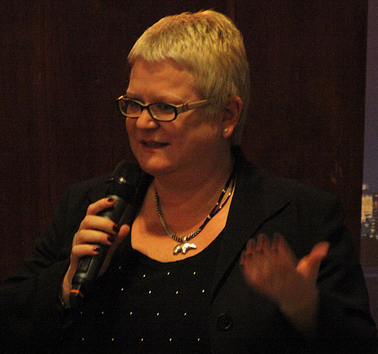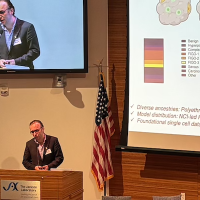Endometriosis Foundation of America
Endometriosis 2013 / Endometriosis & Painful Sex
Lone Hummelshøj
Thank you very much Ms. Chairman for this kind introduction and good afternoon ladies and gentlemen. I have been asked to talk about endometriosis and painful sex. Three little letters can cause so much pleasure and also cause so much pain in women with endometriosis. In this presentation I am going to be touching on some sensitive issues so do not be embarrassed. This is a relatively closed forum except I am live on the internet right now. Be mindful of that when you ask questions later on.
What I am going to be talking about is what painful sex is, it is known as dyspareunia to physicians; the impact of this, the treatment options, what you can do yourselves and just briefly finish with some research priorities. If we look at endometriosis it has sometimes been called the 3D syndrome. Dysmenorrhea, that is painful periods, can be measured in loss of productivity and the amount of bed rest that you need to have because of the pain. Dyspareunia, painful intercourse, is the limitation of sexual activity and dyschezia is what Dr. Sinervo had just been talking about - namely being painful bowel movements and that again can be measured in the frequency of the complaint. But we are going to be talking about sexual activity.
The definition of painful sex is when pain is experienced inside the vagina, just at the level of the cervix but also in the whole pelvis and abdominal region, pain in the vulvar and/or spasms in the vagina when there is insertion. I am sure that those of you who do experience painful sex will say that it does not really matter whether that pain is deep or superficial because if it hurts, it hurts. And if it hurts sex can be a problem.
What I just briefly want to do - do I have a pointer, is this working, yes it is - just to show you a slide view of what a pelvis looks like and where the deposits of endometriosis typically are. If you can see here is the vagina, and if we have endometriosis deposits here or even along here on the bowel, no wonder with insertion that that is going to hurt. It is absolutely, completely anatomically logical that that was going to be very painful. Also, here just at the opening to the uterus, if that is fixed either by adhesions or with more endometriosis deposits and that gets knocked about, you can imagine that that pain is going to be very, very intense. For those of you who are experiencing this, it is very, very real.
And you know what? The WHO actually has stated that sex is one of our human rights. In their report from 2002 they defined reproductive health as something that implies that people are able to have a satisfying and safe sex life and that they have the capacity to reproduce and the freedom to decide if, when and how often to do so, which we touched upon this morning as well. But that actually also links very, very closely to sexual rights and if you look at these that sexual rights embrace human rights that are already recognized in actual law. They include the right of all persons to pursue a satisfying, safe and pleasurable sex life. There you go; it is your right to enjoy it.
However, if it becomes an issue then it certainly can have quite an impact on a relationship and therefore I am very pleased to see that there are many...present here today as well. First of all we are looking at just our general well being, our body images, our self-esteems and as I said, our relationships. What I am going to do now is I am going to show you a series of data to really just confirm for you that you are not alone in experiencing this complaint.
In a large study of almost 3,000 women in eight countries the impact on their sex life was the biggest, single most qualitative life issue that these women were experiencing. We also did a follow up study looking back 15 years when women were first diagnosed with endometriosis and again, 32 percent were still experiencing painful intercourse 15 years after having been diagnosed with the disease. Fifty-six percent of these women also reported that this had a negative impact on their relationships.
A newer study where we have just submitted a manuscript for publication looked at just over 900 women in ten countries. I am not going to go through the blurb on the left hand side that is more for the physicians, they like these kinds of statistics. What I am interested in showing you is that you might recognize this but almost a third of these women first presented with painful intercourse as their main symptoms when they first sought help for endometriosis; their main symptom. When you look at their symptoms today the chronic pain was a huge issue as you can see in 60 percent of these women, painful periods in 57 percent and painful intercourse in almost half of them - 47 percent. Of these women 60 percent said they always experienced pain with intercourse and more than half of them have at times either had to interrupt having sex or wanted to avoid it altogether. I am seeing some nodding around the room as well it sounds familiar. We will get to a little bit about what we can do about it. About half of these women felt that their relationships had been affected by the disease and indeed, in some cases, also caused a split.
Another study that was published last year and this is very, very interesting because this group looked at painful intercourse in women with what is called rectovaginal endometriosis - that is what I was pointing out, the one that is right behind the vagina, compared with women who had endometriosis either on the ovaries or peritoneum and women with no endometriosis. You will see that a quarter of the women with no disease still say that intercourse can be painful. It is not necessarily the endometriosis that is causing that pain even though the two groups of women with endometriosis experienced more frequent pain and more severe, deep pain. There are also these questionnaires one can fill in about sexual functioning and women with endometriosis fared a lot worse in these studies than women without endometriosis.
What can we do about it? Well, there is about a 50 percent chance that either surgery for rectovaginal endometriosis, the endometriosis behind the vagina, or treatment with a progestin called norethisterone acetate will actually improve your symptoms. Personally I do not think 50 percent is a very good number. That still means that half of you will have no resolution for this particular complaint if we are to believe these numbers. Furthermore, there is the slight issue with progestins that they actually themselves can decrease libido and contribute to vaginal dryness. That is hardly something that you want to do if you are trying to improve your sex lives. But there is also an issue with surgery. Some types of surgery can actually also contribute to painful intercourse so I would urge the surgeons here, and also the women, to be very careful in considering what type of surgery you have done. As Dr. Sinervo pointed out before, if you do have endometriosis on the bowel be very, very sure that the surgeon who is going to remove this knows what he or she is doing and that they have experience in removing this particular type of the disease. Do not be scared of shopping around. It is not just your painful health but also your sexual health that is at stake here. I also think it is very important to utilize physical therapists and sexologists. They might be able to guide you as a couple through ways in which you can overcome some of the issues surrounding painful intercourse.
What can you do yourself? I cannot give you the magic solution but I can give you some suggestions. All of these are available on endometriosis.org in an article on painful intercourse so you can go and read more about it there. But first of all think about timing. It is my experience that women with endometriosis know their bodies quite well. Maybe you have found out that there is a time of the month that is better to have sex than at other times. Try and find out when that window of opportunity is and then do not be scared to schedule a date with your lover! Put it in the diary and that is the night when you are going to enjoy yourselves together. Prepare, make it special, have a glass of wine. I know it is not as spontaneous as you would like it to be but it is better than nothing. Think about that when it might actually work well for you. The other thing is position. There are many different sexual positions and you are going to have to experiment with that. Find out - again, I just want you to try and have a look here and imagine that you know what is actually happening when you have sex. Maybe she is on top or on the side; there are lots of different positions you are going to have to experiment with. And do have a little bit of fun when you do that. Try and find out if there is something that works really well for you and does not cause pain.
That brings me to experimentation. Go gentle, try shallow penetration, make sure there is sufficient lubrication and remember that there are many ways to have sex. It does not all have to be intercourse. So, if there are times of the month that works very well with intercourse then take advantage of the moment and enjoy it, and then maybe at other times think about the other ways in which you can pleasure each other.
And finally, this is so important, you have to communicate. I think it is very, very important that the woman is honest about her fear of pain because that fear can cause you to draw back as soon as somebody touches you, you go, "Oh my God he wants to have sex and it is going to hurt". Be open and honest about the fact that this is your reaction. It is not a rejection of your partner and the partner needs to understand that it is not a rejection of them and that these women may even feel very guilty about not wanting to have sex because the are so scared of the pain. Make sure that this communication is done with love, be open not accuse each other but really talk honestly about how you might be able to get your sex life to work. Show that you are willing to do that. I think that these are the suggestions that I can provide to you of things that you can do yourselves and good luck with it.
The final thing is research priorities. We just sort of looked at the whole concept of painful sex. It does mainly affect younger women in the years where we should be having an awful lot of sex! So it is really difficult when that becomes an issue. But you also have to remember if you are not having sex you are not getting pregnant the old fashioned way either, and that is still more fun than egg freezing in my opinion.
We have seen repeatedly in recent studies that we have conducted that it is actually sexual pain and chronic pain that are the factors that most greatly affect women, both physically and mentally when we measure their health related quality of life. We also acknowledge that it can be very difficult to go to the doctor to actually talk about these issues with your physician because it is intimate information. But if you really are determined to make this work you are going to have to talk with your doctor, a physical therapist, a sexologist and be honest about the issues that you are experiencing and explore how they may be able to help you. For the physicians out there you guys need to help these women by asking some good probing questions about how she is actually doing with her endometriosis. Work together on this.
One of the things that you have to try to not do is that if you feel that one doctor is not helping you immediately do not go doctor shopping. Try really to make this relationship work because lots of uncoordinated treatment attempts is not going to help you. If you do not follow these strategies for a longer period of time they may not work long term. As I said earlier painful intercourse together with endometriosis has really been studied in research reports. The World Endometriosis Society has now officially made it a priority that we need to start studying the important distinctions with pain between different subgroups of women with specific symptoms, something I know that Stacey Missmer is going to be addressing later this afternoon in a talk about research priorities. That is also going to help get better therapeutic options available to each individual woman. And again, we are saying to physicians focus on the main painful complaint, which will differ amongst women with endometriosis. Do not treat endometriosis, treat the very specific complaint that woman is presenting with at any given time, be that painful periods, painful sex, infertility, etc. We need to of course consider the broader clinical perspectives, also the psychological and interpersonal consequences. I know that Dr. Wilson is going to be addressing this immediately after me.
That is all I have to say. We will have more data information available at the World Congress on Endometriosis, which takes place next year in Brazil. Mark your diaries now and see you in Sao Paulo.
Thank you for your attention.










